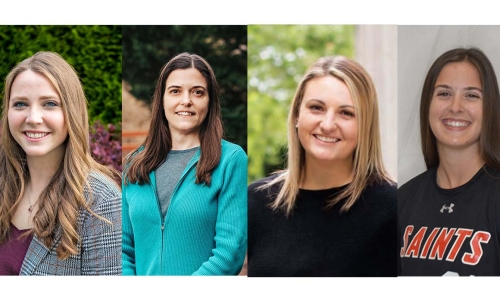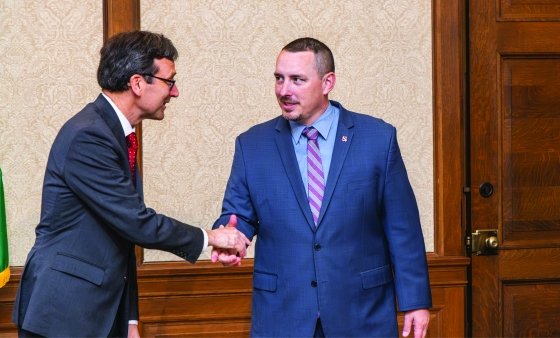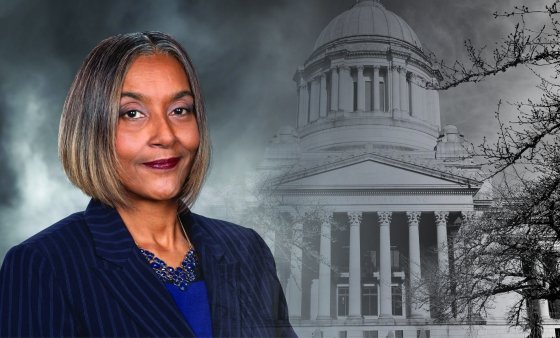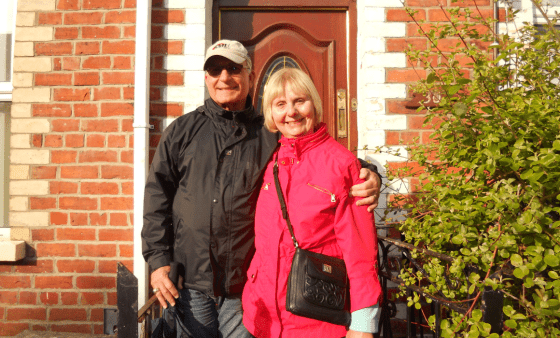Saints Spotlight: Women in Engineering

The women in this story continue to elevate the representation of women in STEM. Representation is important not only for those being represented but for members of systems that are becoming more inclusive. Saint Martin’s is so proud to have played even a small role in the lives of these incredible ladies.
- Dr. Jill Walsh
- Civil Engineering Professor
In honor of International Women in Engineering Day, we are highlighting stories of current and past female students who pursued a degree in engineering. This international awareness campaign helps raise the profile of women in engineering, promotes equal opportunities for women in the industry, and celebrates the achievements of women engineers throughout the world. If you would like to share your story, please send us an email. Now introducing the Saints! Meet Fran, Micaylla, Jessica, Sarah, and Natalie!
Fran Eide ‘83 came to Saint Martin’s in the fall of 1981 as a transfer student from Grays Harbor Community College (GHCC). Eide has had a successful career and recently retired from the City of Olympia after serving over 20 years as the City’s engineer. As a first-generation college student, she understands the importance of mentorship and serves as a valuable mentor with the engineering senior design class.
Micaylla Young; nee O’Leary is also a first-generation college student. Micaylla graduated from Saint Martin’s University in the spring of 2017 and completed the 4+1 program in civil engineering to graduate the following year with her master of civil engineering degree. In addition to her studies, Micaylla was a student athlete and was a member of the women’s soccer team.
Jessica Soward ‘04 is a partner and structural engineer at Sargent Engineers in Olympia. Soward started with Sargent as an intern during college and worked her way through the ranks to join their leadership team. Soward graduated from Saint Martin’s with her bachelor’s degree in civil engineering in 2004. Like Eide, Soward is also a mentor for the engineering senior design class and has been participating in reviewing the projects for almost 15 years.
Sarah Howsden ‘19 is a recent Saint Martin’s graduate and currently works for SCJ Alliance. Howsden was an active member of student life on campus and participated in various extracurricular activities including being President of Saint Martin’s University’s American Society of Civil Engineers chapter, throwing for the track and field team, working in the office of admissions, and attending sporting events as a member of the SMU pep band.
Natalie Zender ‘23 is a current student and came to Saint Martin’s in the fall of 2021 as a transfer student from Skagit Valley College. Zender excels both in the classroom and on the soccer field as she juggles the life of a student-athlete. After graduation, she hopes to get a job with the Department of Natural Resources and work as a forest engineer. Support Natalie and the rest of your lady Saints at their games this season! Go Saints!
Why did you pursue a degree in engineering?
Natalie: I have always loved math and science. My brain works in a mathematical/numerical sense rather than a words and “creativity” sense, so engineering is a good fit for me. I always thought it would be really cool to be a woman in STEM as well because we are such a minority group, especially in the engineering field. That has always inspired me.
Sarah: I wanted to figure out how things worked and how to make things better for the community whether it be adding more sidewalks near schools trying to create safer routes or providing bike paths—providing safe access for routes. I enjoyed my transportation classes during my time as a student. I loved Dr. Bornesal’s transportation classes and learning about soil and concrete from Dr. Walsh and structures.
What are you up to now? Or where do you hope to be?
Jessica: I am a partner and structural engineer at Sargent Engineers in Olympia. Sargent Engineers is a consulting firm that specializes in structures. I started with Sargent as an intern in college and worked my way through the ranks to join leadership. I work on a variety of structural projects including bridges, buildings, water reservoirs, and retaining walls. A lot of my recent projects are bridge and culvert replacements related to fish barrier corrections, which I really enjoy. Since we do a lot of public works projects which we have to compete against other firms for, I am also responsible for preparing statements of qualifications and presentations to win new work. Recruiting and hiring is also a big part of my job.
Natalie: After I graduate, I hope to get a job with the DNR and work as a forest engineer. Where I would be designing and building logging roads and bridges. Hiking and being outdoors are some of my favorite things to do during my free time, so having that be a major part of my career would be exciting for me. Logging also has been in my family for many generations, so getting to carry that tradition on in my own way is important to me. In 5 or 10 years I hope to be working, and married with a family.
How did Saint Martin’s help prepare you for your career?
Micaylla: My time at Saint Martin’s prepared me well for working for both the private and public sectors. The courses at Saint Martin’s had a good balance of teaching an owners/state prospective and the client serving aspects of working for a private firm.
Jessica: I was able to take a lot of structural-specific classes as part of my coursework in the civil engineering program at Saint Martin’s. Having all those structural electives made it easier to be productive in a real design office and having those classes on my transcript helped me land internships in college, which ultimately led to my permanent position at Sargent Engineers. Saint Martin’s University was a great launching base for me.
Sarah: I worked for Dr. Pam in the admissions office as one of the student ambassadors. She was in a leadership program with an engineer named Ross. It just so happened Ross was looking for interns and it was through her connection and introduction that I was able to get my foot in the door. Saint Martin’s taught me the importance of relationship building and having conversational skills to network with people around me. I also learned a lot about the Benedictine practice of listening with the ear of your heart. Being an engineer means being tasked with many projects and being able to work well with others on these projects is an important part of completing the task. Sometimes the projects we are tasked with are not the most exciting but they are important to our clients and to the community they serve. Because of this, they are important to me and I want to make sure I can provide the services needed to help improve the greater community. Sometimes the projects we are tasked with are not the most exciting but they are important to our clients and to the community they serve. Because of this, they are important to me and I want to make sure I can provide the services needed to help improve the greater community.
Who influenced you the most during your time at Saint Martin’s?
Jessica: Professor Sladek and Dr. Seong from the civil engineering department had the biggest impact on my learning and professional development at Saint Martin’s. Both taught me a tremendous amount about structures, which is what I specialize in, and Professor Sladek really did a great job of replicating real-world scenarios for us to apply our skills. I still have binders at the office of notes and assignments from their classes that I will probably always keep.
Sarah: I would say my dad and my grandpa. My grandpa was a project engineer for the federal highway administration back in the ’80s. So, he was super excited when he found out that I wanted to be a civil engineer and build roads. He was like, ‘Do it, let's go...someone needs to go and learn how to create these roads.’ He was always there cheering me on, especially when things got rough with classes. My dad has also been incredibly supportive. He works in construction, and he has always encouraged me to follow my dreams. He is always there for me when I need someone to vent to which was an important part of getting through college.
What was your proudest moment in your engineering career thus far?
Jessica: My proudest moments are seeing projects go through the stages of design development, to contract documents, to a finished project on the ground. Finding solutions for clients and communities and seeing them turn into reality is a great feeling. It is also great seeing engineers I have mentored have their own successful projects.
Fran: I just retired from the City of Olympia after a return to Olympia Public Works in November of 1998, and after 20 years as the City’s engineer.
Sarah: One of my proudest moments in my engineering career thus far was a roadway project in Centralia for Borst Avenue. This road connects the middle and high schools and the old road did not have sidewalks or a safe path for students to walk from one school to the other. This project added a 10 ft sidewalk for pedestrians and cyclists, much needed stormwater flow control and treatment, and traffic calming devices as a means of trying to slow speeds down to provide safer routes for students walking/biking to school. I was an inspector for this project and it was amazing to see how the construction process worked and how excited the community was to see the change and use of the road now.
Natalie: So far, my proudest moment has been finishing my classes this year with great grades. Considering how busy I am all the time; I am proud of myself for prioritizing my classes and studying before other things. It is a habit that will get me to the places I want to be in life.
Tell us more about the life of a student-athlete. What was that experience like for you?
Micaylla: My time at SMU, as a student-athlete, helped instill some foundational skills that have contributed to success in my career and personal life. Although playing soccer, working, and having a demanding course load was challenging, it truly help develop fundamental time management and communication skills that have been necessary for successfully balancing life as a working mom. The ability to communicate conflicting game/travel schedules with exams/project assignments translated extremely well with multiple project demands and personal schedules.
Natalie: Being a part of athletics definitely makes things more difficult, I have less time for things outside of class and softball. Balancing it is something I am used to, I have been a part of competitive sports (both basketball and softball) since I was in grade school, only when I went to college did I play only one sport. So, having a packed schedule is nothing new to me. However, my schooling here is much more difficult and time-consuming than my previous college or high school experience. Once you get to your upper-level major classes, things get tough and more rigorous and demanding. Combining that with missing classes because of a road trip for away games or having class non-stop all day and then going straight into a 4-hour practice, it starts to get hard to sit down and study or do homework after a long day. I think what helps me is making a list and having a planner. Just simply being able to check off a box for a completed homework assignment helps me immensely. Another thing that I try to do is stay ahead, I try to start my homework or studying as soon as possible because I know if I wait it will be too late. Along with that is prioritizing myself, I try to do at least one “fun” thing a week or something that I want to do, it could be as simple as watching an episode of a tv show or going out with friends one night. Taking a break is important to prioritize, especially as a student-athlete. Athletics have also taught me a lot of life lessons. It has taught me things like work ethic, how to work as a team, camaraderie, and how to never give up. It has also gotten me through tougher things like, how to handle working with someone you don’t get along with all the time, how to be a good teammate and person when things aren’t going your way, how to believe in yourself when you feel alone, the list goes on. Athletics has been the main event in my life for as long as I can remember, it has been a major influence on many of my big life decisions. Without it, I don’t know where I would be today.
What advice do you have for current students?
Jessica: Don't expect any less of yourself because you're female, and don't expect others to expect less of you because you're female. I have found that if I approach situations with knowledge, respect, and confidence, I am usually treated with equal respect to my male counterparts. Don't be afraid to show what you know.
Sarah: When I was going through the program one of my biggest mantras was 'somebody did this before me so I know it is possible to do it.' Some days were a lot harder than others but when I kept reminding myself of that and the goal I had for myself I kept pushing forward. I had my family and friends in my corner cheering me on. It is important to find your people for your support in your academic journey, you are not in this alone.
Tell us about your experience mentoring for the senior design class.
Jessica: I have been participating in reviewing the senior design projects and presentations for the civil engineering program for almost 15 years. I remember as a student how helpful it was to hear from practicing engineers about how the things we learned in school get applied in practice. Typically I'm asking questions and providing insight into design processes or codes/standards that students should be applying to their projects and providing an audience for them to present to. Mentoring upcoming engineers is one of the things I enjoy most about our profession.
Fran: I am a mentor with the senior design class. After 38 years in engineering, I still believe I have a lot to learn, and that I have a lot to share. How we “do engineering” has changed. It is a VERY exciting time to be an engineer. There is much to be done on behalf of our planet. I enjoy helping shape the next group of engineers that will take on the task of designing and constructing the very foundation of any community – its infrastructure in a sustainable, resilient way.
Why is it important for women to share their stories?
Jessica: I think it's important to show that it isn't unusual for women to be interested and talented in STEM disciplines. Sharing our stories helps people realize the potential in others, as well as themselves, and move beyond their current gender or race-based expectations. Yeah yeah yeah, I'm female, so are a lot of people. Now did you see my latest fish passage project? That is something interesting to talk about!
Natalie: While I was growing up, I never really heard about women in engineering or women in STEM jobs. It wasn’t until high school that I really started to hear about all the opportunities there are for women who want to go into STEM. I especially think it is important for these women to share their stories because you never know who it might inspire to become the next woman in STEM. I was inspired by a woman I interviewed in high school for an essay I was writing. At first, I was considering it as just an assignment I needed to get done I so I could turn in my essay, but after completing the interview I found that what she had to say was very interesting to me and I started to think seriously about how I could be like her. It’s also important for women to share their stories because we are a minority group in this field. In most of my classes I am either the only girl, or one of the few girls in the class. I have always felt empowered by the fact that I can prove to myself and other females that we can do anything a man can do and better if we put our mind to it. The more we voice our stories the younger girls we can empower to take that leap of faith into a daunting field.
Sarah: It is important to share stories because there are other people who have experienced the same things you have. You can hear how they were able to handle difficult situations and what they learned from that experience and how to make it better for the future. I have been fortunate enough to not have experienced a lot of sexism in my career thus far but I have friends who have not been as fortunate. I have had friends say they were asked 'can I talk to the engineer please', if they were the engineer's wife, or if they were the office secretary. By sharing these stories and having these conversations are an important part of ending the stigma of engineering being just for the men, this is a field for everyone.
Civil Engineering
Ready to tackle real-world issues, help solve problems in your community and examine what it means to be an ethical engineer in the 21st century? Civil engineering may be the right major for you.
- Campus
-
- Main (Lacey)
- Type of Instruction
-
- In Person
- Degree
-
- Bachelor of Science



